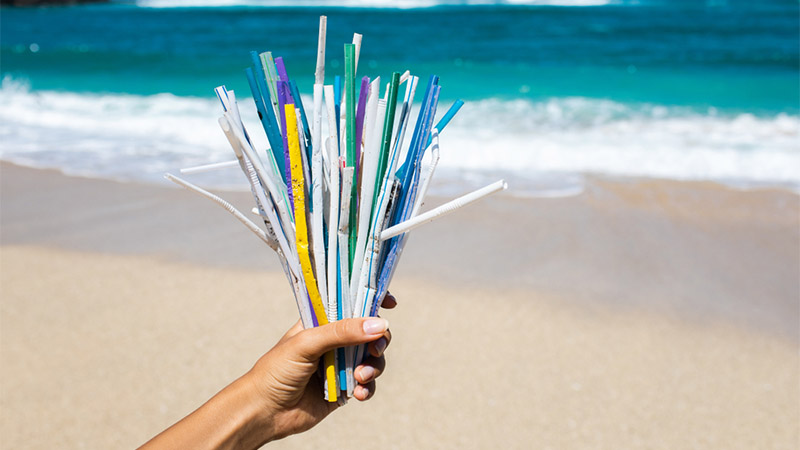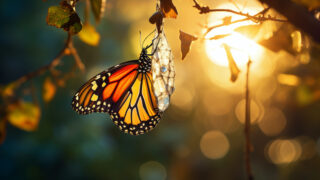What’s all the fuss about plastic straws? They’re just straws, right? Are they really as bad for the environment as everybody has us thinking? How could a seemingly innocuous thing like a straw become public enemy number one, the target of every ocean-loving citizen on the globe?
Well, it may have all started in 2015 when a student of Texas A&M was in Costa Rica, studying sea turtles. She posted a graphic video of a long plastic straw painfully being pulled from a turtle’s nose. That heart-wrenching video went viral, with more than 5.5 million views, and the turtle became a sort of poster child for why straws are bad.
And then there was Molly Steer. In 2017, at the tender age of nine, she watched a movie called A Plastic Ocean. She walked out of the film upset, desperate to do something to help her planet. She got the idea to ask her principal if they could ban straws at her school in Cairns, Australia – and they did.
Things started to heat up. In January of 2018, the Surfrider Foundation (an environmental group focused on ocean pollution) declared 2018 would be “the year we say goodbye to straws”.
One thing led to another and now plastic straws are starting to be seen as evil plastic cylinders that are destroying our oceans. Municipalities across the globe are banning them. Eateries everywhere are turning their backs on the single-use wonder wands.
Why it matters
Straws reportedly only make up about 0.025 percent of the plastic that ends up in the ocean. Doesn’t seem like much, right? But one study has estimated that 8.3 billion plastic straws pollute our beaches. Wow.
Hong Kong is no different. During one volunteer clean-up of a single beach on Lantau, more than 500 plastic straws were collected. And a fifth of those showed bite marks from fish – which means the plastic is going into our food chain.
And that’s just on the beaches. What about the ones stuck in the Great Pacific Garbage Patch? Or in the bellies of a bird? Did you know seabirds can eat the equivalent of eight percent of body weight in plastic? That’s like a woman carrying twins. Even if a critter doesn’t actually swallow the straw, they’re still ingesting plastic. Those straws in the ocean break down into teeny-tiny pieces of plastic known as microplastics. It’s projected that by 2050, 99 percent of sea birds will have ingested plastic this way, possibly killing half of them. Fish have already swallowed lots of plastic, even the deepest water species. If you eat fish, you’ve ingested microplastics, too.
A slow change
Here in Hong Kong, businesses are beginning to make an effort to stop providing plastic straws, and organisations such as Plastic Free Seas, EcoDrive and Green Monday are starting to tackle the problem head on.
So far, the largest international company to say no to straws is Starbucks; it’s in the process of replacing straws with sippy cup lids in all its worldwide outlets. The company plans to be straw-free by 2020, which means an estimated one billion fewer straws in the years to come. McDonald’s is going straw-free in Ireland and the United Kingdom. Hyatt is providing straws only on request. Last month, the US state of California banned straws at all sit-down eateries. And the entire EU is now aiming to be straw-free by 2021.
Does it really make a difference?
Still, who cares? Straws aren’t all that big. Correct: they aren’t big. And because they aren’t big, they are often too lightweight to make it through the mechanical recycling sorters, so they get disposed of as garbage. Or, they simply blow away and, again, are tossed out with the garbage.
The sad truth is, even if you toss plastic into a recycling bin, it’s likely not to be recycled. By some accounts, as much as 79 percent of plastic ends up in landfills or is incinerated. In Hong Kong, the stats are just as bad. Only four per cent of plastic was recycled in 2018, with the rest being incinerated. And there we are, feeling all smug about having tossed our plastic cup into a special bin this morning. It doesn’t seem to make a huge difference, does it?
How to help
That’s exactly why not using a straw is key. If straws aren’t being recycled and they aren’t always making it into the right spot in the garbage, they’re likely to end up in our oceans and on our beaches. How can we stop that from happening? By not using one. The only people who really need a straw are those with a medical reason to use one – somebody who has had a stroke, for example, or has autism, MS or the like.
If you’re really hankering for a straw, the new hip thing to do that screams “I love my planet” is to whip out your own set of metal straws at a restaurant. There are other planet-friendly options, too: bamboo, glass, paper and a good ol’ fashioned straw straw. A Vietnamese-based company has also started making a new-fangled straw out of grass. The best part? You can even chew them after eating to clean your teeth and gums. How’s that for efficient?
The naysayers
Many are critical of these straw bans. They say we’re focusing on the wrong plastic: bottles and fishing nets are far bigger problems. And hey, the sippy cups replacing straws at Starbucks are made out of even more plastic (though they claim they are easier to recycle).
All that may be so, but banning straws is a gateway to finding a bigger solution.
“People need to take responsibility of their own plastic consumption habits at the end of the day,” says Tom Peacock-Nazil from Seven Clean Seas, another organisation fighting the scourge of plastic straws. “Although the problem is a lot bigger than straws, they are a great place to start. Hopefully, people refusing straws is just the first step they take towards a life free of unnecessary and single-use plastic.”
So, suck it up. Carry a metal straw. Sure, they’re hard to clean and a bit heavy, but so what? Better yet, sip a drink from the edge of a cup. Oh. My. God. What a concept! So what if your teeth get a little stained from your coffee? You can be proud of your brown toothy smile, knowing you got it by saving the planet, one sip at a time.
See more in our Living in Hong Kong section
26 ways to enjoy Hong Kong’s waters
Where to live in Hong Kong
This article first appeared in the October/November 2019 issue of Expat Living magazine. Subscribe now so you never miss an issue.






